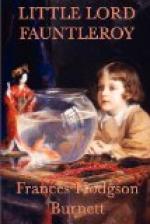And the second reason was even worse, because it was a new one and had been talked about with the most excited interest.
Who did not know of the old nobleman’s fury when his handsome son the Captain had married the American lady? Who did not know how cruelly he had treated the Captain, and how the big, gay, sweet-smiling young man, who was the only member of the grand family any one liked, had died in a foreign land, poor and unforgiven? Who did not know how fiercely his lordship had hated the poor young creature who had been this son’s wife, and how he had hated the thought of her child and never meant to see the boy—until his two sons died and left him without an heir? And then, who did not know that he had looked forward without any affection or pleasure to his grandson’s coming, and that he had made up his mind that he should find the boy a vulgar, awkward, pert American lad, more likely to disgrace his noble name than to honor it?
The proud, angry old man thought he had kept all his thoughts secret. He did not suppose any one had dared to guess at, much less talk over what he felt, and dreaded; but his servants watched him, and read his face and his ill-humors and fits of gloom, and discussed them in the servants’ hall. And while he thought himself quite secure from the common herd, Thomas was telling Jane and the cook, and the butler, and the housemaids and the other footmen that it was his opinion that “the hold man was wuss than usual a-thinkin’ hover the Capting’s boy, an’ hanticipatin’ as he won’t be no credit to the fambly. An’ serve him right,” added Thomas; “hit’s ’is hown fault. Wot can he iggspect from a child brought up in pore circumstances in that there low Hamerica?”
And as the Reverend Mr. Mordaunt walked under the great trees, he remembered that this questionable little boy had arrived at the Castle only the evening before, and that there were nine chances to one that his lordship’s worst fears were realized, and twenty-two chances to one that if the poor little fellow had disappointed him, the Earl was even now in a tearing rage, and ready to vent all his rancor on the first person who called—which it appeared probable would be his reverend self.
Judge then of his amazement when, as Thomas opened the library door, his ears were greeted by a delighted ring of childish laughter.
“That’s two out!” shouted an excited, clear little voice. “You see it’s two out!”
And there was the Earl’s chair, and the gout-stool, and his foot on it; and by him a small table and a game on it; and quite close to him, actually leaning against his arm and his ungouty knee, was a little boy with face glowing, and eyes dancing with excitement. “It’s two out!” the little stranger cried. “You hadn’t any luck that time, had you?”—And then they both recognized at once that some one had come in.
The Earl glanced around, knitting his shaggy eyebrows as he had a trick of doing, and when he saw who it was, Mr. Mordaunt was still more surprised to see that he looked even less disagreeable than usual instead of more so. In fact, he looked almost as if he had forgotten for the moment how disagreeable he was, and how unpleasant he really could make himself when he tried.




